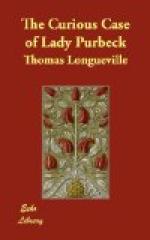It is likely that her life soon became that of an invalid, for she died in the year 1645, when staying with her mother at Oxford. In that year the Court of Charles I. was at this town, which may account for her own and her mother’s presence there. As we saw, in the first chapter, there is some question as to whether Lady Purbeck was born in the year 1599 or in 1600, so she may have been either forty-five or forty-six at the time of her death. Her life, although of very moderate length, had been one of considerable adventure, which may have told heavily upon her constitution; if her personal concerns were peaceful at the time of her death, we know that the conditions of the King and of the Court, together with the prospects of all of high rank who were loyal to the Crown, were then causing great anxiety and excitement at Oxford: and this may well have had a bad effect upon the health of an invalid.
Of Lady Purbeck’s character much less is recorded than of the characters of several other leading figures in this story—her father, her mother, Bacon, Buckingham. We know, however, that she faithfully nursed during his last two years her surly old father, who had treated her abominably and spoiled her life; that she never lost the friendship of Lord Purbeck; that, in her trouble she sought the consolations of religion in a Church which would require a full confession of her sins, accompanied by sincere repentance and virtuous resolutions; that she bore an excellent character in Paris; and that she spent her last years with her husband or her mother. It is true that she had sinned, that she had sinned grievously; but, when we consider her education under parents who were fighting like cat and dog, the marriage which was forced upon her, and the dissolute Court in which she, a singularly beautiful woman, spent the early years of her married life, we may well hesitate before we look for stones to cast at her memory.
And, after all, the only description of her character, of any length, which we have been able to find, namely, that given by Sir Kenelm Digby, is highly favourable. If an apology be required for repeating it, that apology is humbly given.
After declaring that of “wit, courage, generosity, and other heroic parts,” nature had given Lady Purbeck “a double share,” together with “all other noble endowments,” Sir Kenelm says: “I have not seen more prudence, sweetness, honour and bravery shown by any woman that I know, than this unfortunate lady showeth she hath such a rich stock of. Besides her natural endowments, doubtless her afflictions add much; or rather have polished, refined and heightened, what nature gave her.”
Even when we have made due allowance for the fact that the pen of Sir Kenelm Digby was inclined to be a little flowery, sufficient is left in this description of Lady Purbeck to make her character attractive, and we know that nature had added to her charms by endowing her with exceptional beauty. No attempt shall be made here to exaggerate either her attractions or her virtues, much less to extenuate or minimise her faults; but let us at least forgive the latter.




